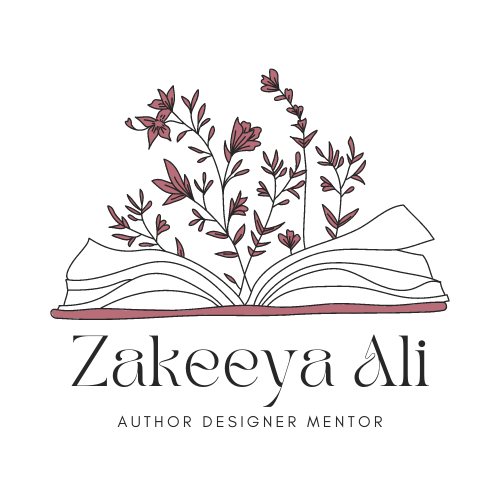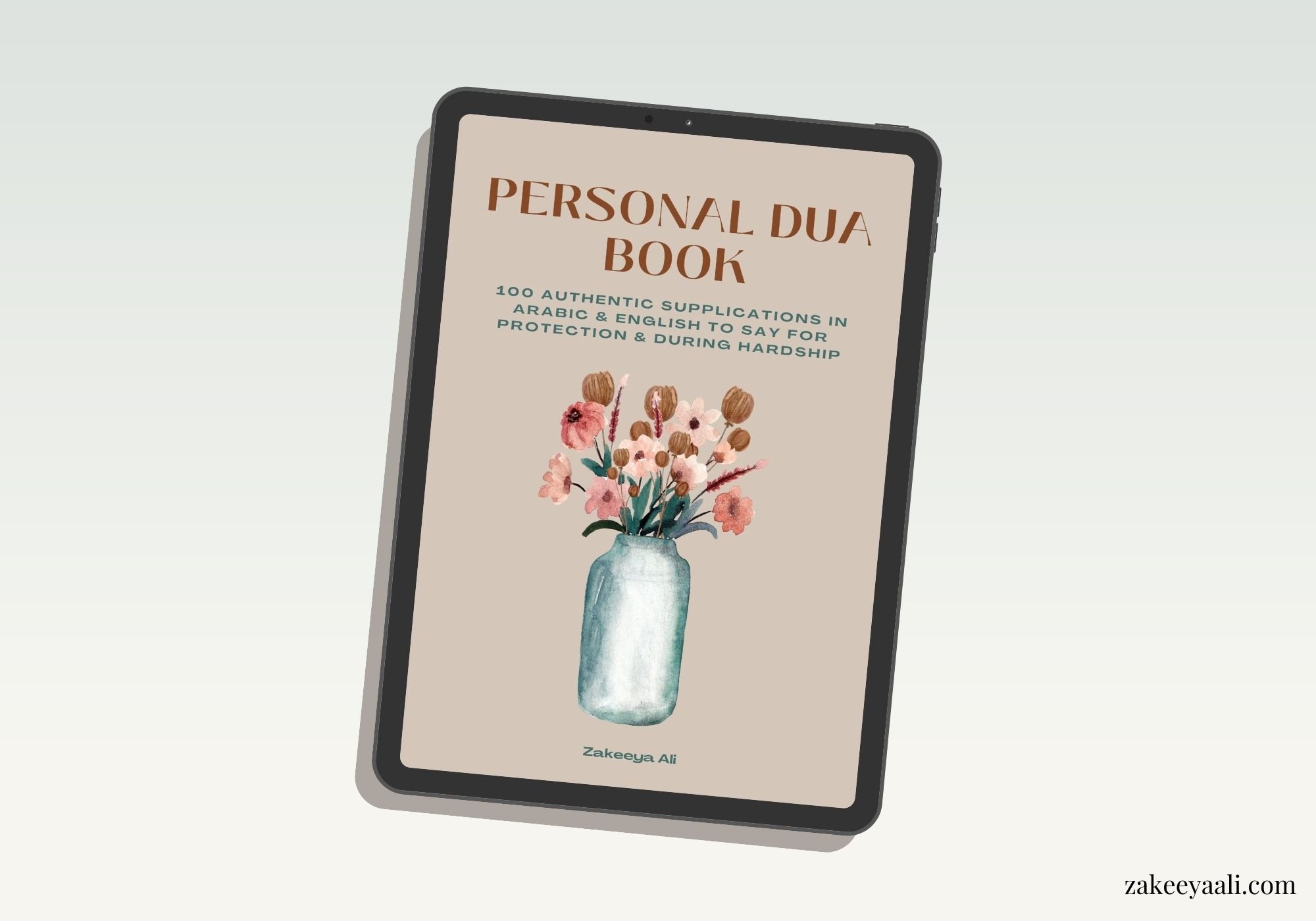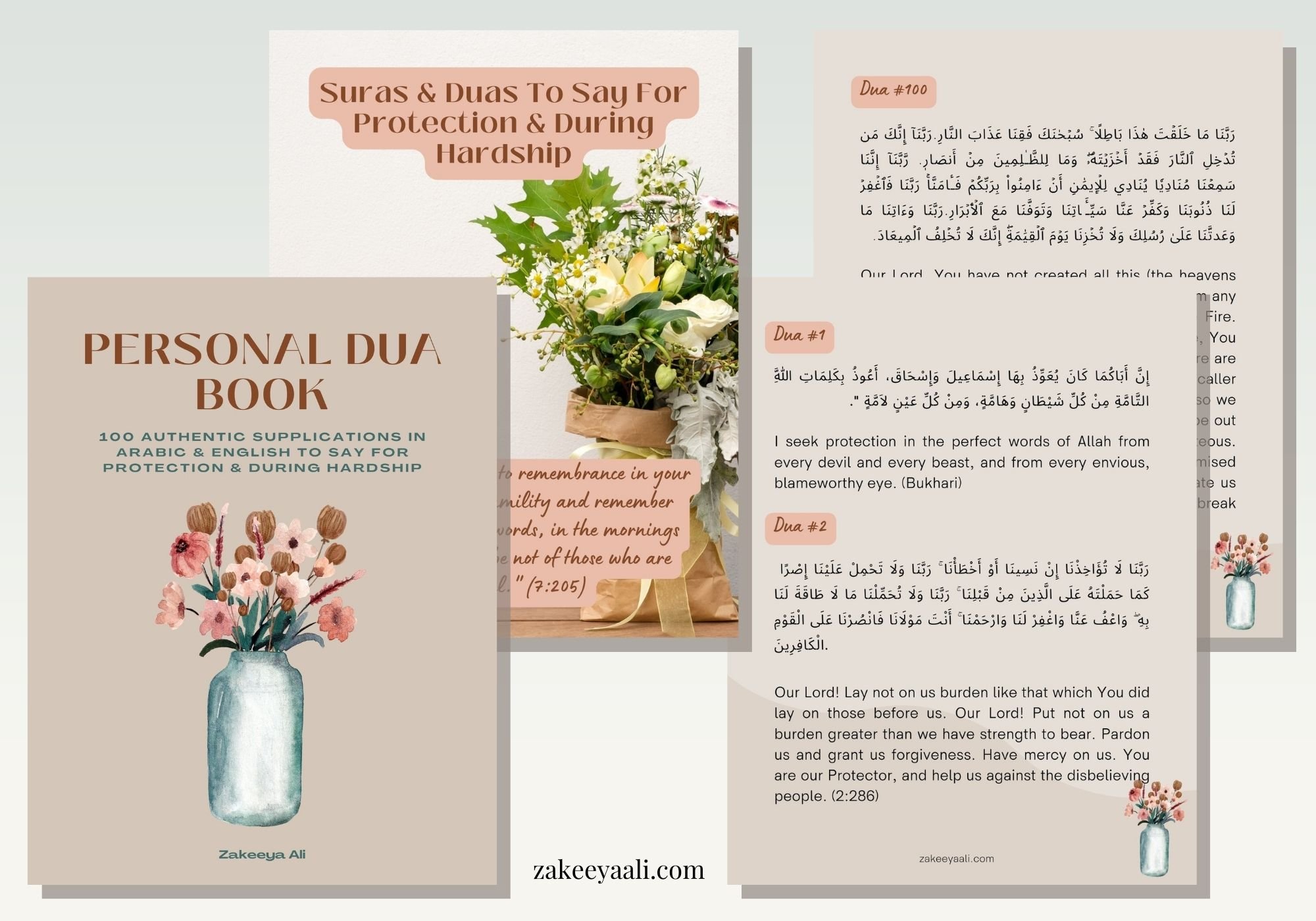How I Start And End My Day With Dua
This is part 3 of my dua series for Muslims. You can read You can read Part 1 - Why I Love Dua As A Muslim and Part 2 - How To Get Your Duas Accepted. You can also purchase a Dua Journal to have everything you need at your disposal and make your dua journey complete inshallah.
Every minute counts when you are a busy Muslim, so you don't have a lot of time to accomplish many extra things in your day.
However, I make the time for my duas, because it brings morebarakah to my time. Not only that, but my day runs smoothly, my heart’s at peace, and my thoughts don't run rampant with worry. I also don’t feel anxious and impatient with my day-to-day issues.
The Way I Start And End My Day With Dua
It’s simple and literally takes me less than 10 minutes a day. As soon as I awake at Fajr, I say my morning dua before doing anything else. Before going to bed at Isha, I say my evening dua.
Before I had memorized my morning and evening duas, I would read the duas from my phone which I place on my bedside. I go straight to my duas, ignoring all notifications because I made a commitment to myself to do just that without getting distracted.
You can read your duas from:
A dua app on your smartphone.
Take a screenshot of the dua on this post.
Use a dua book or journal.
You can print out the duas or write it out on a page.
You can stick the morning and evening dua to your wall or add it to a frame beside your bed. This is also great to do for your kids. You can set an alarm on your phone to say "morning dua" instead of "wake up" and “evening dua” at bedtime to remember to say your duas twice a day.
Now I am going to share my favorite morning and evening dua (though there are other ones to choose from) and the rest of my worship routine so you can get idea of how I start and end my day. This has increased my blessings and patience, and strengthens my heart.
The Morning Time
Step 1: I Recite The Morning Dua
أَصْبَحْنَا وَأَصْبَحَ الْمُلْكُ لِلَّهِ وَالْحَمْدُ لِلَّهِ، لَا إِلَهَ إِلَّّا اللَّهُ وَحْدَهُ لَا شَرِيكَ لَهُ، لَهُ الْمُلْكُ وَلَهُ الْحَمْدُ وَهُوَ عَلَى كُلِّ شَيْءٍ قَدِيرٌ، رَبِّ أَسْأَلُكَ خَيْرَ مَا فِيْ هَذَا الْيَوْمِ وَخَيْرَ مَا بَعْدَهُ، وَأَعُوْذُ بِكَ مِنْ شَرِّ مَا فِي هَذَا الْيَوْمِ وَشَرِّ مَا بَعْدَهُ، رَبِّ أَعُوْذُ بِكَ مِنَ الْكَسَلِ، وَسُوءِ الْكِبَرِ، رَبِّ أَعُوْذُ بِكَ مِنْ عَذَابٍ فِيْ النَّارِ وَعَذَابٍ فِيْ الْقَبْرِ.
Asbahna wa-asbahal-mulku lillah walhamdu lillah la ilaha illal-lah, wahdahu la shareeka lah, lahul-mulku walahul-hamd, wahuwa AAala kulli shayin qadeer, rabbi as-aluka khayra ma fee hatha-alyawmi, wakhayra ma baAAdaho, wa-aAAoothu bika min sharri hatha-alyawmi, washarri ma baAAdaho, rabbi aAAoothu bika minal-kasal, wasoo-il kibar, rabbi aAAoothu bika min AAathabin fin-nar, waAAathabin fil-qabr.
“The morning has come to me and the whole universe belongs to Allah, the Lord of the worlds. O Allah, I ask of you the good of the day, it's success and aid and it's celestial light and blessings, and seek guidance and refuge from the evil of this day and the evil that is to come later.” (Abu Dawood)
Step 2: I Recite the Ayat al-Kursi
Ayat al-Kursi (The Throne) is a verse from the Quran that speaks about Allah’s Unique Oneness. That He Alone is Absolutely Living (al-Hayy), whom all life depends upon for its very existence. That He is Absolutely Sustaining (al-Qayyum), who needs none to sustain Him and Who sustains all things in every way, at every moment. The rest of the verse tells us about the Absolute Knowledge, Will, and Power of our Mighty and Merciful Lord.
ٱللَّهُ لَآ إِلَـٰهَ إِلَّا هُوَ ٱلْحَىُّ ٱلْقَيُّومُ ۚ لَا تَأْخُذُهُۥ سِنَةٌۭ وَلَا نَوْمٌۭ ۚ لَّهُۥ مَا فِى ٱلسَّمَـٰوَٰتِ وَمَا فِى ٱلْأَرْضِ ۗ مَن ذَا ٱلَّذِى يَشْفَعُ عِندَهُۥٓ إِلَّا بِإِذْنِهِۦ ۚ يَعْلَمُ مَا بَيْنَ أَيْدِيهِمْ وَمَا خَلْفَهُمْ ۖ وَلَا يُحِيطُونَ بِشَىْءٍۢ مِّنْ عِلْمِهِۦٓ إِلَّا بِمَا شَآءَ ۚ وَسِعَ كُرْسِيُّهُ ٱلسَّمَـٰوَٰتِ وَٱلْأَرْضَ ۖ وَلَا يَـُٔودُهُۥ حِفْظُهُمَا ۚ وَهُوَ ٱلْعَلِىُّ ٱلْعَظِيم
Allahu laaa ilaaha illaa huwal haiyul qai-yoom; laa taakhuzuhoo sinatunw wa laa nawm; lahoo maa fissamaawaati wa maa fil ard; man zallazee yashfa'u indahooo illaa be iznih; ya'lamu maa baina aideehim wa maa khalfahum; wa laa yuheetoona beshai 'immin 'ilmihee illa be maa shaaaa; wasi'a kursiyyuhus samaa waati wal arda wa la ya'ooduho hifzuhumaa; wa huwal aliyyul 'azeem
“Allah, there is no god except Him. He is the Living One, the All-Sustaining. Neither drowsiness befalls Him nor sleep. To Him belongs whatever is in the heavens and whatever is on the earth. Who is it that may intercede with Him except with His permission? He knows what is before them and what is behind them, and they do not comprehend anything of His knowledge except what He wishes. His seat embraces the heavens and the earth and He is not wearied by their preservation, and He is the All-exalted, the All-supreme. There is no compulsion in religion: rectitude has become distinct from error. So one who disavows fake deities and has faith in Allah has held fast to the firmest handle for which there is no breaking; and Allah is all-hearing, all-knowing.”
Step 3: I Recite Sura Al-Ikhlas (The Purity)
Next, I Recite Surat al-Ikhlas which tells us about the Absolute Uniqueness and Perfection of Allah (Al-Ahad, the Unique One). That He is Absolutely Independent (Al-Samad) whom all depend upon. The Absolutely Self-Reliant, and the Absolutely Distinct from everything in every way. Everything is created by Him and dependent upon Him.
1. قُلْ هُوَ اللَّهُ أَحَدٌ
2. اللَّهُ الصَّمَدُ
3. لَمْ يَلِدْ وَلَمْ يُولَدْ
4. وَلَمْ يَكُنْ لَهُ كُفُوًا أَحَدٌ
Qul huwal laahu ahad
Allah hus-samad
Lam yalid wa lam yoolad
Wa lam yakul-lahoo kufuwan ahad
“Say: He is Allah, (the) One. Allah the Self-Sufficient Master, Whom all creatures need, He begets not, nor was He begotten; And there is none equal or comparable unto Him.”
Step 4: I Recite Surah An-Nas (Mankind)
I recite Surat al-Falaq and Surat al-Nas which teach us to seek shelter in the protection, care, and mercy of Allah from every type of harm - recognizing that our hope, fear, reliance, and trust are only upon Him SWT.
بِسْمِ اللَّهِ الرَّحْمَٰنِ الرَّحِيمِ
1. قُلْ أَعُوذُ بِرَبِّ النَّاسِ
2. مَلِكِ النَّاسِ
3. إِلَٰهِ النَّاسِ
4. مِنْ شَرِّ الْوَسْوَاسِ الْخَنَّاسِ
5. الَّذِي يُوَسْوِسُ فِي صُدُورِ النَّاسِ
6. مِنَ الْجِنَّةِ وَالنَّاسِ
Bismillaahir Rahmaanir Raheem
Qul a'oozu birabbin naas
Malikin naas
Ilaahin naas
Min sharril waswaasil khannaas
Allazee yuwaswisu fee sudoorin naas
Minal jinnati wannaas
“Say: I seek refuge with (Allah) the Lord of mankind, The King of mankind, The Ilah (God) of mankind, From the evil of the whisperer (devil who whispers evil in the hearts of men) who withdraws (from his whispering in one's heart after one remembers Allah , Who whispers in the breasts of mankind, of jinn and men.”
Step 5: I Recite Surah Al-Falaq (The Dawn)
1. قُلْ أَعُوذُ بِرَبِّ الْفَلَقِ
2. مِنْ شَرِّ مَا خَلَقَ
3. وَمِنْ شَرِّ غَاسِقٍ إِذَا وَقَبَ
4. وَمِنْ شَرِّ النَّفَّاثَاتِ فِي الْعُقَدِ
5. وَمِنْ شَرِّ حَاسِدٍ إِذَا حَسَدَ
Bismillaahir Rahmaanir Raheem
Qul a'oozu bi rabbil-falaq
Min sharri maa khalaq
Wa min sharri ghaasiqin izaa waqab
Wa min sharrin-naffaa-saati fil 'uqad
Wa min sharri haasidin izaa hasad
“Say: I seek refuge with (Allah) the Lord of the daybreak, From the evil of what He has created; And from the evil of the darkening (night) as it comes with its darkness; (or the moon as it sets or goes away); And from the evil of those who practice witchcraft when they blow in knots, And from the evil of the envier when he envies.”
I try to say the morning dua, ayat al kursi, and the quls as a minimum before I start my day. I also teach my children this valuable habit.
I tell them that it will start their day off on the right foot by bringing them more sakinah and barakah in their day. Most mornings, I will continue with the steps below because the Prophet PBUH said:
"When any one of you prays, let him start by praising Allah, then let him send blessings upon the Prophet, then let him say du'a however he wishes." - Tirmidhi
Step 4: I Ask Allah For Forgiveness
I continue my morning worship routine by say some dhikr. I will say:
أَسْتَغْفِرُ اللهَ وَأَتُوْبُ إِلَيْهِ.
Astaghfiru-l-llāh wa atūbu ilayh.
Astaghfirullah (I seek forgiveness from God).
I will say this 33 times or merely 3 times depending on my morning.
Step 5: I Praise Allah
Next I will say:
سُبْحَانَ اللهِ ، اَلْحَمْدُ للهِ ، اَللهُ أَكْبَرُ
Subḥāna-llāh. Alḥamdu li-llāh, Allāhu akbar.
Alhumdulillah (Praise be to God).
Subhanallah (Glory be to God).
Allahu Akbar (God is Great).
Also either 33 times of just 3 times if I am short of time.
Step 6: I Send Blessings On The Prophet PBUH
When we send salawat on the Prophet PBUH, we gain the same reward for ourselves and Allah SWT recommends it.
“Verily, Allah and His angels send their prayer upon the Prophet. O you who believe, send your prayer upon him as well as peace. - The Quran
I say:
صَلَّى اللّٰهُ عَلَيْهِ وَسَلَّمَ
Sallallahu Alayhi Wasallam,
Salallahu alayhi was salaam (Peace and blessing upon the Messenger).
I will try to say this 33 times or an odd number I can manage.
Step 7: I Say The Duas For Protection
You can find those duas online, on a dua app, or you can read my post, The Duas I Say Daily For Protection.
Step 8: I Say The Duas for Hardship
You can find those duas online, on a dua app, or you can read my post, The Duas I Say For Hardship and Distress.
Step 9: I Say My Personal Duas
I wrote a list of my personal duas in my Dua Journal to remember all I want to ask at this blessed time. Alternatively, I will say my my most important personal duas from memory.
The Evening Time
After Isha, I say the evening dua, Ayat al-Kursi, the quls as a minimum. If I am able, I will also say a few of my favorite duas for protection, especially the one narrated by Abu Darda.
I say some duas for hardship if I am going through a struggle and recite the dua for illness if any of us are sick and mention the names of the sick ones.
I say my evening worship routine after Isha and not before bedtime, as I noticed I was not keeping to it most nights. This was due to feeling tired or distracted by family, life, or feeling tired.
Ideally, I know it is recommended to perform Isha and your evening dua as the last thing you do before you sleep, but I remind myself that it’s better to do it than to be idealistic and miss it. However it’s always good to aim to improve when you can.
Evening Dua
اَمْسَيْنَا وَاَمْسَ الْمُلْكُ لِلَّهِ وَالْحَمْدُ لِلَّهِ، لَا إِلَهَ إِلَّّا اللَّهُ وَحْدَهُ لَا شَرِيكَ لَهُ، لَهُ الْمُلْكُ وَلَهُ الْحَمْدُ وَهُوَ عَلَى كُلِّ شَيْءٍ قَدِيرٌ، رَبِّ أَسْأَلُكَ خَيْرَ مَا فِيْ هَذَا اللَّيْلَةِ وَخَيْرَ مَا بَعْدَهُ، وَأَعُوْذُ بِكَ مِنْ شَرِّ مَا فِي هَذَا اللَّيْلَةِ وَشَرِّ مَا بَعْدَهُ، رَبِّ أَعُوْذُ بِكَ مِنَ الْكَسَلِ، وَسُوءِ الْكِبَرِ، رَبِّ أَعُوْذُ بِكَ مِنْ عَذَابٍ فِيْ النَّارِ وَعَذَابٍ فِيْ الْقَبْرِ.
Amsayna wa-amsal-mulku lillah walhamdu lillah la ilaha illal-lah, wahdahu la shareeka lah, lahul-mulku walahul-hamd, wahuwa AAala kulli shayin qadeer, rabbi as-aluka khayra ma fee hathihil-laylah, wakhayra ma baAAdaha, wa-aAAoothu bika min sharri hathihil-laylah, washarri ma baAAdaha, rabbi aAAoothu bika minal-kasal, wasoo-il kibar, rabbi aAAoothu bika min AAathabin fin-nar, waAAathabin fil-qabr.
“The evening has come to me and the whole universe belongs to Allah who is The Lord of the worlds. O Allah, I ask of you the good of the night, it's success and aid and its celestial light and blessings, and seek guidance and refuge from the evil of this night and the evil that is to come later.” (Abu Dawood)
Then I will say:
The Ayat ul Kursi.
The Quls.
Some duas for protection (sometimes just 2).
Some duas if I'‘m facing hardship (2 or 3 of them).
Dua for anyone who is ill.
Make some light dhikr (most nights I do it 3 times).
My most urgent personal duas.
This is the way I instill dua in my life as a busy Muslim. It may sound like a lot, but it really takes very little time. I broke up my routine into steps to make it clear to understand - so I hope it’s beneficial for you.
Remember!
You can say your duas in your first language as it doesn’t have to be said in Arabic. I also like to say the ayat al kursi and my quls at these times in English, as I usually am saying it in Arabic in my prayers or from memory. This has also helped me make the connection of the meaning when I do say the Arabic.
Once you have instilled some or all of these duas as a habit for yourself, I recommend that you teach this valuable start and end to the day to your children. I can honestly say that it has been amazingly beneficial in making me have a great day and a restful sleep at night.
I urge you to try it!
In part 4 of my Dua Series, The Duas I Say For Hardship, I will share the supplications that can help you during your time of need.
My Recommended Read
The Book of Remembrance (Kitab Al-Adhkar) by Imam Yahya ibn Sharaf an-Nawawi
This is a thick, in-depth book with a compilation of words of remembrance and glorification (dhikr), and a supplicatory prayer (du'a) to the Lord of the Universe as related from His final messenger, Prophet Muhammad PBUH.
Salam, I’m Zakeeya!
I believe being a wife, a mother, and making our homes a sanctuary for our families brings us tremendous blessings, fulfillment, and improves society. Since 2011, I've been committed to helping Muslimas find tranquility in their roles, take better care of themselves, and attain contentment within. Our journey is not an easy one, but I pray the resources and mentoring I offer, will assist in navigating you through your everyday challenges with mindfulness and gratitude, inshallah. Join me as I share wifehood, motherhood, homemaking, and lifestyle solutions that make life more fulfilling for you as a woman! READ MORE
Do You Need Support as a Sister?
If you are struggling in your life and need professional support for personal development, you can book a one-on-one mentoring session with me to get tailored advice.
Do You Want to Instill Your Daily Dose of Dua?
Order my handy dua ebooks, which are available in an Arabic/English or English only version, and contain 100 authentic duas to say for protection and during hardship.






